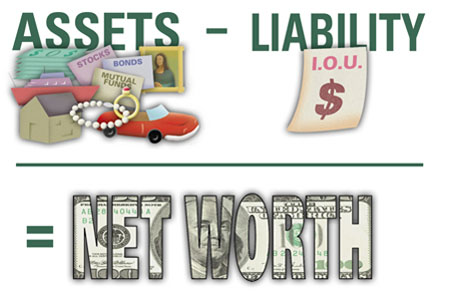“Tracking your net worth gives you… idea of your future economic condition.”

Within the personal finance community, the term net worth statement is thrown about pretty regularly. While the accounting majors and the finance nerds will all be working with a common definition, don’t assume everyone you talk to is using the term interchangeably.
For starters, your net worth is everything your own minus everything you owe. It’s really that simple. All of your assets get listed in one column; things like your home, automobile, cash in the bank, investments, real estate, cash value life insurance, even personal property like furniture and household goods.
In the next column you list all of your liabilities; things like outstanding auto loan and mortgage balances, credit card balances, student load debts, tax liens…essentially any sum of money you owe that someone will come looking for should you not pay it. You will almost invariably get a statement of any of your liabilities short of informal loans from friends and family.
That’s the technical definition and relatively straightforward. But here is where it gets a little confusing. Some people insist that you don’t count your personal residence, personal automobile, or personal property since those assets generally don’t produce cash flow. It’s a concept talked about by several finance authors that only cash flow producing assets be counted since you can’t live off your house or your ratty old couch.
While I get the notion, they’d also flunk Accounting 101. Your net worth has nothing to do with cash flow. Asset values are entirely market based as if they were to be sold.
There are a couple of different kind of assets however.
Liquid assets are things like stocks, bonds, mutual funds, CDs, and actual cash in the bank or in the coffee can buried out in the yard. Essentially, if you get an account statement or can count it out in physical bills…it’s a liquid asset. Liquid assets are easily converted into currency or exist in currency form. For example, it’s easy to sell a stock or bond, redeem a CD, or simply make a withdrawal down at the bank.
Illiquid assets are things that have a tangible market value but aren’t readily convertible to cash. Your home and car are the two biggest illiquid assets most people own, often making up a disproportionate amount of their net worth. Those assets will have to be sold to convert to cash and finding a buyer will take time. That’s opposite of say a stock or mutual fund which has a market price minute by minute during the trading day and can be sold nearly instantly. Values on illiquid assets are a bit muddy as well, Zillow might have their “Zestimate” of your home’s value and KBB will have an opinion of what your car is worth…but finding a buyer at that price might be difficult under some conditions and in some conditions could fetch $10s of thousands more.
Separating your assets into liquid and illiquid categories will give you a better idea of what sort of income your assets can produce but are uncorrelated to the value of the asset itself. Stocks will frequently pay dividends; bonds will pay interest and cash deposits are frequently held in interest bearing accounts. Even an illiquid asset like a rental property will produce cash flow in the form of rent payments.
Here is a list of common misconceptions about your net worth calculation.
Gold and silver are an illiquid asset, not currency. Even in common coin form like Canadian Maple Leafs, Double Eagles, and Kruggerands they have to be sold to be converted into currency. Don’t count on the spot price either, most dealers won’t pay spot for either bullion or coins.
Your utility bills, insurance bills, and current year tax bills are not liabilities, they’re expenses. A tax lien or judgement is a liability.
Don’t overestimate your personal property values. Many financial planners will use your insurance amounts for personal property or simply omit it altogether unless it’s something of peculiar value like a collection or equipment. No one wants your couch so assigning a value to it is a little superfluous.
Automobile values are readily calculated via Kelly Blue Book (KBB.com) or NADA. Don’t overestimate condition, be realistic there but also be aware if you need to find a buyer you may need to discount it.
Your mortgage payment is not a liability, your mortgage balance is.
Your term life insurance amount is not an asset, your permanent life insurance policy’s cash value is.
With all due respect to many of the personal finance authors, cash flow has nothing to do with your Net Worth Statement. That’s a Cash Flow Statement and I’ll cover that in a future article. Tracking your net worth gives you data that your wealth is growing or declining and an idea of your future economic condition. Reviewing it and tracking once a quarter or once per year is a good idea and many financial professionals believe that managing your net worth is an integral part of learning to manage your finances.
